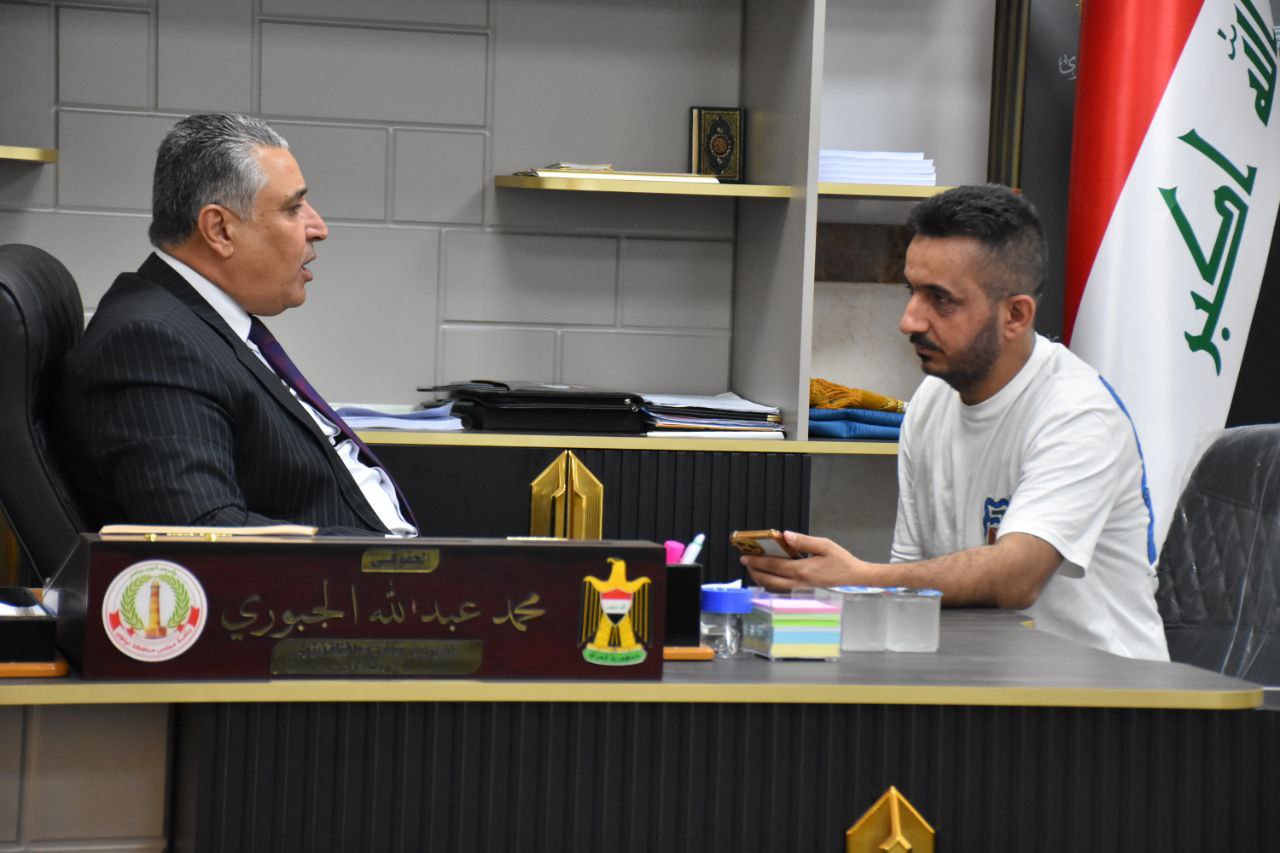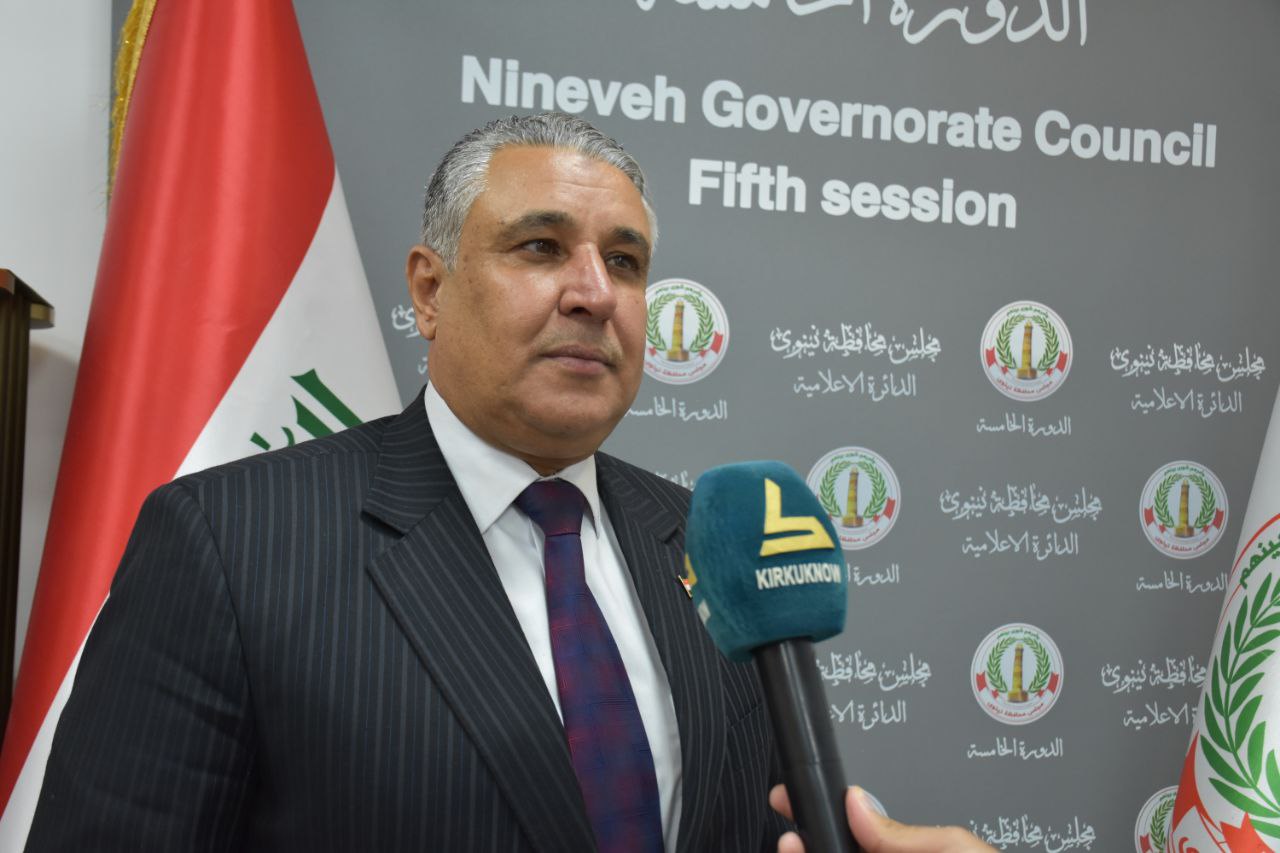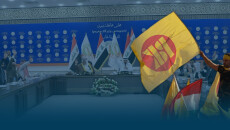The Vice Chairman of Nineveh Provincial Council, criticized certain blocs within the council, accusing them of disrupting the council's work and creating obstacles for the governor who has brought significant projects to the province.
Mohammed Abdullah Al-Jubouri’s statements came in a special interview with KirkukNow after the council failed to hold its regular sessions due to a lack of a legal quorum for the second time, with only 14 members out of 29 members attending the session.
Following the delay of the session scheduled for August 26, Al-Jubouri spoke to KirkukNow from his office, stating, “If any member is absent for four consecutive sessions, they will be dismissed from the provincial council.”
He highlighted the obstacles hindering the council's work, including the delay in implementing projects from the 2024 budget, incomplete work of five committees, and delay by committee heads and members.
“We have conducted an assessment and will hold a press conference soon to clarify which committees are operational and which are not.”
The Nineveh Provincial Council is currently embroiled in a conflict between two factions unwilling to compromise on their demands and actively seeking a resolution to the crisis.
The ongoing Nineveh crisis began approximately a month ago when the provincial council, with the participation of over half of its members, voted to elect the heads of the administrative units in the province: mayors for districts and sub-districts. This decision led to the Kurdistan Democratic Party KDP and the United Nineveh Alliance blocs boycotting sessions and suspending their membership in protest.
The council is divided into two factions. The first is the Future Nineveh Alliance, which successfully elected the heads of the administrative units holding 16 out of 29 total seats. This faction comprises the Coordination Framework forces, the Patriotic Union of Kurdistan PUK bloc, Sunni members, and three minority quota members.
The second faction consists of the United Nineveh Alliance and the KDP, holding 13 seats.
The Presidency of the Council was elected months ago as part of a single package with the positions of the governor and his two deputies, according to an agreement between all the blocs, including the United Nineveh Alliance.
The Kurds have six seats in the current provincial council of Nineveh (four for the KDP and two for the PUK) out of 29 seats, so they have only the post of the first deputy governor while they previously had a council speaker and deputy governor.
KirkukNow: Two months ago, the provincial council voted to elect heads of 20 administrative units, causing problems and disputes. What is the current status of this issue, as disputes have prevented the council from securing a legal quorum for sessions?
Al-Jubouri: According to the amended Governorates Law No. 21 of 2008 and recent decisions and procedures, the powers of district and sub-district councils were transferred to the provincial council. Heads of 20 administrative units were elected, some of which were vacant while others had expired their legal term. Unfortunately, no orders have been issued to initiate these appointments. The law also allows the governor to challenge the council's decisions if they violate the constitution, or laws, or exceed the council's jurisdiction. The governor can appeal within 15 days and escalate to the Federal Supreme Court if necessary.

The provincial council is currently standing by its decisions. The ball is in the court of the Federal Court, and we respect its decisions, which are binding and must be implemented.
KirkukNow: Due to disagreements, over a third of council members are boycotting meetings. What impact will this have on the council's work and what are the potential consequences?
Al-Jubouri: The internal regulations do not allow for council boycotts. Members who are absent for four consecutive sessions after the quorum is met will be dismissed. Attendance records are maintained when sessions are scheduled but quorum is not met, to inform the public of absent members.
KirkukNow: What are the current priorities of the council?
Al-Jubouri: The council's main tasks include oversight, local legislation, and policy-making. Security, stability, and service provision are top priorities. Real projects are underway, thanks to Governor Abdul Qader Al-Dakhil's efforts and strong relationships with the federal government and neighboring governorates. However, certain blocs within the council are obstructing progress. We aim to address this issue through an upcoming press conference.
KirkukNow: What is the purpose of the evaluation you mentioned?
Al-Jubouri: The evaluation aims to inform citizens about the council's operational status.
KirkukNow: Discussing and approving the governorate's budget is a key responsibility of the council. Have any steps been taken in this regard?
Al-Jubouri: The council has over 17 main tasks, including approving the provincial budget based on population ratios.
We are awaiting the 2024 budget plan from Nineveh Governorate, which has been significantly delayed. Citizen and civil society participation will be crucial in reviewing and approving the budget.
KirkukNow: How do you plan to improve oversight and accelerate the local projects?
Al-Jubouri: Oversight relies on organized council sessions and active committee work. Completing the five incomplete committees and ensuring regular council sessions are essential for effective monitoring.
KirkukNow: If the council crisis persists, what is the solution?
Al-Jubouri: The council is subject to oversight by various bodies, including the integrity commission, financial audit, and the judiciary, as well as the public. Members must be held accountable, and sessions must be organized to fulfill the council's supervisory role.






